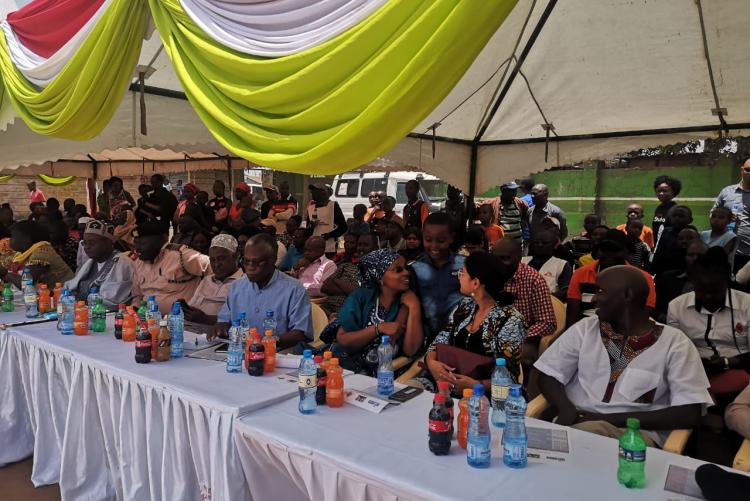The African Women’s Studies Centre (AWSC) is based at the University of Nairobi. The Centre is informed by the recognition that the experiences of African women in almost all spheres of life have been invisible. The Centre therefore aims to bring women’s experiences, knowledge, needs and world view to mainstream knowledge and processes. The Centre recognizes the efforts made by the Government of Kenya towards implementation of food security. However, given the poverty situation in the country and the food security vulnerability, more needs to be done towards enhancement of an all-inclusive countrywide food security policy and programming.
The AWSC has therefore chosen to focus on working with parliament, county assemblies, national and county governments and other policy makers in order to ensure the implementation of article 43 (1)(c) that guarantees Kenyans the right to food. The Centre also plans to complement and support the implementation of the Food Security and Nutrition Policy as well as other initiatives such as the National Social Protection Policy, Agriculture, Fisheries and Food Authority Act among other policy documents aimed at ensuring food and nutrition security. The project also takes cognizance of the many provisions in the new constitution that offer new system of government where decentralization and people’s participation in policies and programmes is entrenched as well as schedule four of the constitution that devolves some of the activities related to food security to the county governments.
The research findings and recommendations presented here are a follow up of AWSC presentation of best practices report and recommendation on the implementation of Article 43 (1)(c) to the 10th parliament in 2012 during the budget hearings. With this financial support from treasury through the Ministry of Education and UoN (AWSC), put together a team of experts to work on this research. The team of researchers included economist, experts in the fields of agriculture, social scientists and legal experts. University of Nairobi also developed a Memorandum of Understanding with the Kenya National Bureau of Statistics to work on the household baseline survey on food security.
AWSC conducted the research in collaboration with KNBS during the calendar year 2013. The research was carried out in the six agro-ecological zones and in 20 counties namely: Kisii, Nairobi, Kiambu, Nakuru, Elgeyo-Marakwet, Kirinyaga, Kajiado, Bomet, Makueni, Bungoma, Taita Taveta, Migori, Trans Nzoia, Turkana, Baringo, Isiolo, Kwale, Mombasa, Nandi, Laikipia.The objectives of the research were to: establish the status of food security in the Country; review best practices in institutional, legal and policy frameworks for implementation of Article 43 (1)(c) and make policy recommendations at the national and county levels; involve citizens’ participation in development of food security initiatives; use evidence based advocacy for greater allocation of resources for food security initiatives; establish whether the economic, social and political pillars of Vision 2030 take into consideration food security concerns. In addition, the team was to evaluate vision 2030 pillars using the research findings for their capacity to ensure food security; share the research findings with the food security stakeholders (policy makers, civil society organizations and the general public) at the county and national levels; generate proposals for ensuring full implementation of Article 43 (1)(c) of the Kenya Constitution 2010 and to document women’s experiences, knowledge and perceptions in relation to food security and share the findings.
The methodologies used by the researchers included a household survey where 4,200 households in the 20 counties were interviewed on their food security status using a hunger module that assessed experiences in the last 10 months. The issues addressed included: availability, access, utilisation and sustainability. In addition to this household survey, views of opinion leaders were sough through: key informant questionnaire, Focus Group Discussions and debriefing sessions. Institutional questionnaire were administered to get the opinions of government officials on food security in each of the counties visited.
Initial research findings were shared with county governments, members of the county assemblies and members of the CSOs for further input. Research findings from the 20 counties and desk review on institutional, policy and legal frameworks were shared at a national workshop with the chairpersons of the agriculture committees of the county assemblies.
AttachmentSize
Baringo County Report,APM - UoN press - Oct. 27, 2014.doc2.73 MB
Nairobi County report finalised.doc2.03 MB
Food Security Final Report.docx1.02 MB
Kiambu County.doc6.24 MB
Nandi County Report APMDec Revised by Prof Kabira - Jan. 29, 2015 - ACCEPTED CHANGES.docx2.68 MB
Migori County-Dr.Omoke_.doc1.73 MB
Kisii County Report.doc1.7 MB
Bomet-final.doc3.6 MB
Stakeholders Report.docx1.53 MB
AWSC-COG Development FSIS -Proposed Stakeholders Workshop-Revised.docx87.52 KB
Food Security Bill- Lobby Document- May 11, 2015.doc24.57 MB
Justification for FSB -28.03.2014.pdf359.72 KB
Status of Food Security Bill 2014 - December 17, 2015 - Final-1.doc1.52 MB
AWSC MTEF Budget Proposals for the FY 2013-14-15-16.doc109.5 KB

